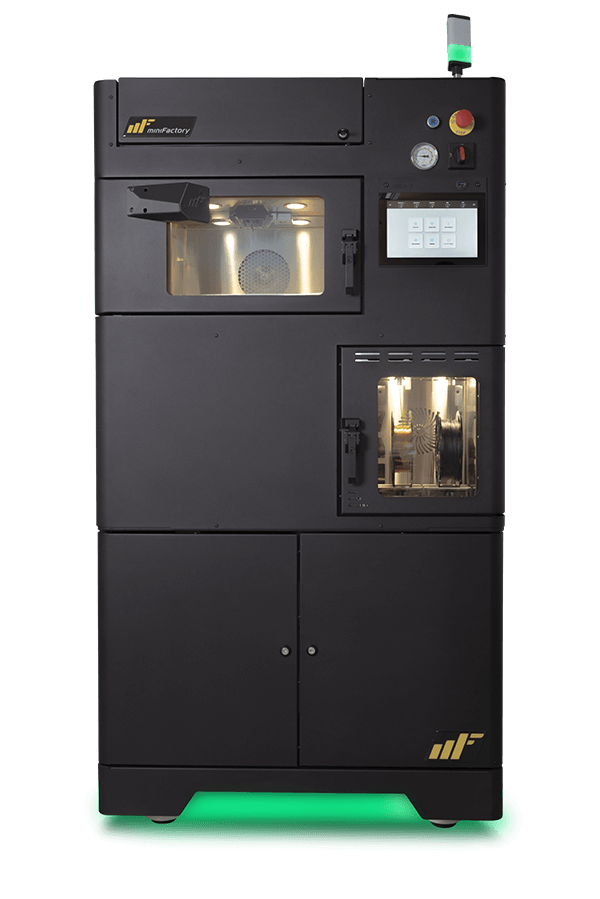L'impression 3D devient une méthode de fabrication de plus en plus courante dans l'industrie électronique, car de grandes quantités d'équipements électroniques sont placées dans des environnements exigeants. Cela crée des exigences spécifiques pour les matériaux et structures utilisés pour protéger et isoler l'électronique. La technologie d'impression 3D de miniFactory apporte une solution à cette problématique en combinant liberté de conception et polymères haute performance.
L'impression 3D de pièces isolantes en ultra-polymères est une méthode de fabrication extrêmement rentable. Elle devrait donc être envisagée pour un large éventail d'applications à haute température dans l'électronique.
Les matériaux sûrs contre les décharges électrostatiques (ESD) sont utilisés pour réduire la décharge d'électricité statique. Lorsque le polymère de base du matériau ESD est un ultra-polymère, la pièce imprimée en 3D peut être utilisée dans les applications les plus exigeantes.
La technologie d'impression 3D de miniFactory permet d'intégrer l'électronique dans les pièces fabriquées. Cette méthode permet, par exemple, d'incorporer le câblage et les composants électriques dans les structures, les protégeant ainsi des effets de l'environnement.
Les polymères haute performance offrent des propriétés d'isolation électrique extrêmes à des températures remarquablement élevées allant jusqu'à 250 °C. Cela permet de nouvelles applications où la légèreté du polymère est combinée à d'excellentes propriétés d'isolation. Avec l'électrification de l'industrie du transport, l'impression 3D de polymères haute performance peut offrir des solutions légères, sûres et rentables pour toute la fabrication de véhicules.
Grâce à l'impression 3D dans l'électronique, les boîtiers et protections les plus complexes peuvent être fabriqués à l'aide de ces matériaux haute performance. Par exemple, une telle application pourrait être un boîtier pour un moteur électrique afin de garantir la sécurité de l'utilisateur ou un support de fixation qui doit être personnalisé en fonction de la forme d'un circuit imprimé.
Les matériaux ESD haute performance permettent la fabrication de gabarits et de supports dans des environnements où les plastiques techniques traditionnels sont insuffisants. L'impression 3D dans l'électronique permet une production rapide et économique.
Les composants électriques sont des éléments essentiels de nombreuses machines et dispositifs. Il est donc primordial de protéger l'électronique dans tous les environnements afin d'éviter les dysfonctionnements. L'un des risques contre lesquels l'électronique doit être protégée est la décharge électrostatique. Grâce aux matériaux ESD sûrs, la décharge électrostatique peut être minimisée et la sécurité du composant électrique assurée. Lorsqu'il existe d'autres contraintes telles que des températures élevées, des radiations ou des produits chimiques, les polymères haute performance offrent une protection supplémentaire.
Lorsque des composants électriques tels que des capteurs, des contrôleurs ou des câbles sont exposés à des conditions difficiles, comme un mouvement continu, des impacts ou des produits chimiques, leur durée de vie est souvent réduite. Grâce à l'impression 3D dans l'électronique, ces composants peuvent être intégrés dans la structure d'une pièce. Lorsque le câblage ou un capteur est scellé à l'intérieur, il est protégé contre ces facteurs externes et la corrosion. Cela ouvre de nouvelles possibilités pour l'intégration de l'électronique et permet la création d'assemblages modulaires.
One example of such an integrated application could be an assembly where an inductive sensor is sealed inside a high-performance polymer part that protects the sensor from external impacts but allows it to identify desired metal objects.

Contactez-nous et nos spécialistes vous répondront rapidement.
« * » indique les champs nécessaires